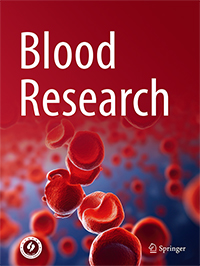Korean J Hematol 2003; 38(4):
Published online December 31, 2003
© The Korean Society of Hematology
급성백혈병에서의 Akt 발현과 그 임상적 의의
맹호영, 정준원, 이승태, 한지숙, 고윤웅, 민유홍
연세대학교 의과대학 내과학교실,
두뇌한국, 사업단
Akt Expression in Acute Leukemia Cells and Its Clinical Significance.
BACKGROUND :
Disturbances in apoptosis through phosphoinositide 3-kinase(PI3K)/Akt pathway is thought to be crucial in cancer cell immortality. Enhanced expression and activation of Akt was investigated in several malignancies but not in acute leukemia. We investigated the expression of Akt and phospho-Akt in acute leukemia cells and clinical characteristics of expression and non-expression group.
METHODS :
Bone marrow cells from patients who were newly diagnosed as acute leukemia and healthy volunteer were obtained and analyzed by Western blot analysis using monoclonal antibody against Akt, phospho-Akt (Ser473), and phospho-Akt (Thr308). Clinical data were obtained retrospectively.
RESULTS :
The expression of Akt was demonstrated in 27 of 43 cases (63%) and phospho- Akt(Ser473) was noted in 24 of 27 (54%) Akt-positive cases, respectively. Phospho-Akt (Ser473)-expression group showed significantly higher initial WBC counts compared to negative group (P=0.003). By chromosomal analysis, patients with Akt expression did not show any good prognostic karyotype (P=0.001).
CONCLUSION :
This result suggests that Akt overexpression and activation is detected in acute leukemia cells and might have a role in molecular pathogenesis of acute leukemia.
Keywords Akt, Acute leukemia, WBC count, Karyotype, Cell signaling
Article
Korean J Hematol 2003; 38(4): 253-260
Published online December 31, 2003
Copyright © The Korean Society of Hematology.
급성백혈병에서의 Akt 발현과 그 임상적 의의
맹호영, 정준원, 이승태, 한지숙, 고윤웅, 민유홍
연세대학교 의과대학 내과학교실,
두뇌한국, 사업단
Akt Expression in Acute Leukemia Cells and Its Clinical Significance.
Ho Young Maeng, June Won Cheong, Seung Tae Lee,
Yoo Hong Min, Jee Sook Hahn, Yun Woong Ko
Department of Internal Medicine, Yonsei University College of Medicine, Seoul, Korea
Korea and Brain Korea, Project for Medical Science, Korea.
Abstract
BACKGROUND :
Disturbances in apoptosis through phosphoinositide 3-kinase(PI3K)/Akt pathway is thought to be crucial in cancer cell immortality. Enhanced expression and activation of Akt was investigated in several malignancies but not in acute leukemia. We investigated the expression of Akt and phospho-Akt in acute leukemia cells and clinical characteristics of expression and non-expression group.
METHODS :
Bone marrow cells from patients who were newly diagnosed as acute leukemia and healthy volunteer were obtained and analyzed by Western blot analysis using monoclonal antibody against Akt, phospho-Akt (Ser473), and phospho-Akt (Thr308). Clinical data were obtained retrospectively.
RESULTS :
The expression of Akt was demonstrated in 27 of 43 cases (63%) and phospho- Akt(Ser473) was noted in 24 of 27 (54%) Akt-positive cases, respectively. Phospho-Akt (Ser473)-expression group showed significantly higher initial WBC counts compared to negative group (P=0.003). By chromosomal analysis, patients with Akt expression did not show any good prognostic karyotype (P=0.001).
CONCLUSION :
This result suggests that Akt overexpression and activation is detected in acute leukemia cells and might have a role in molecular pathogenesis of acute leukemia.
Keywords: Akt, Acute leukemia, WBC count, Karyotype, Cell signaling

Article Tools
Stats or Metrics
Related articles in BR
-
Development and validation of a comorbidity index for predicting survival outcomes after allogeneic stem cell transplantation in adult patients with acute leukemia: a Korean nationwide cohort study
Sung-Soo Park, Hee-Je Kim, Tong Yoon Kim, Joon yeop Lee, Jong Hyuk Lee, Gi June Min, Silvia Park, Jae-Ho Yoon, Sung-Eun Lee, Byung-Sik Cho, Ki-Seong Eom, Yoo-Jin Kim, Seok Lee, Dong-Wook Kim
Blood Res 2021; 56(3): 184-196 -
Changing the frequency and spectra of chromosomal aberrations in Korean patients with acute leukemia in a tertiary care hospital
Je-Hyun Park, Min-Gu Kang, Hye-Ran Kim, Young-Eun Lee, Jun Hyung Lee, Hyun-Jung Choi, Jong-Hee Shin, Myung-Geun Shin
Blood Res 2020; 55(4): 225-245 -
Allogeneic hematopoietic cell transplantation for acute leukemia in first relapse or second remission
Je-Hwan Lee, Sung-Soo Yoon, Chul Won Jung, Jung-Hee Lee, Dae-Young Kim, Young-Shin Lee, Sung Cheol Yun, Inho Kim, Seonyang Park, Byoung Kook Kim, Kihyun Kim, Jin Seok Ahn, and Kyoo-Hyung Lee
Korean J Hematol 2010; 45(2): 95-101




 PDF
PDF Standard view
Standard view Export citation
Export citation Share
Share  Previous Article
Previous Article



